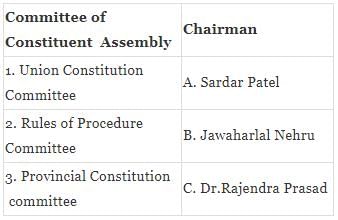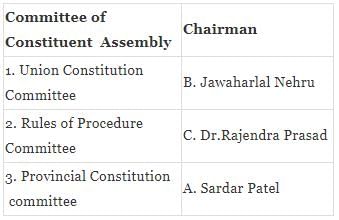Test: Polity - 5 - UPSC MCQ
30 Questions MCQ Test - Test: Polity - 5
Which of the following Directive Principles of State Policy is/are not based on Socialist principles?
1. Equal pay for equal work.
2. Free legal aid to the poor.
3. Participation of workers in the management of industries.
4. Protection and improvement of the environment.
Select the correct answer using the code given below:
1. Equal pay for equal work.
2. Free legal aid to the poor.
3. Participation of workers in the management of industries.
4. Protection and improvement of the environment.
Select the correct answer using the code given below:
Consider the following statements regarding Public Interest Litigation (PIL):
1. Under PIL, courts take litigations from those parties that are affected directly or indirectly however, not on suo-moto basis.
2. Landlord–tenant matters can be settled through PIL.
3. To avoid misuse of the PIL, Court should be fully satisfied that substantial public interest is involved before entertaining the petition.
Which of the above statements is/are correct?
1. Under PIL, courts take litigations from those parties that are affected directly or indirectly however, not on suo-moto basis.
2. Landlord–tenant matters can be settled through PIL.
3. To avoid misuse of the PIL, Court should be fully satisfied that substantial public interest is involved before entertaining the petition.
Which of the above statements is/are correct?
| 1 Crore+ students have signed up on EduRev. Have you? Download the App |
Consider the following statements regarding Appropriation Bill:
1. It is introduced to provide for the appropriation, out of the Consolidated Fund of India.
2. Amendments can be proposed to the appropriation bill to alter the destination of any grant only in the Lok Sabha.
Which of the above statements is/are incorrect?
1. It is introduced to provide for the appropriation, out of the Consolidated Fund of India.
2. Amendments can be proposed to the appropriation bill to alter the destination of any grant only in the Lok Sabha.
Which of the above statements is/are incorrect?
The definition of ‘State’, as provided in Article 12 of the Indian Constitution, includes which of the following authorities?
1. Parliament of India
2. The Legislature of each of the States
3. LIC and ONGC
4. District Boards
Select the correct answer using the code given below:
Consider the following statements regarding the Estimates Committee:
1. Estimates committee has representation only from Lok Sabha.
2. It examines the budget estimates before they have been voted by the Parliament.
Which of the above statements is/are correct?
Consider the following statements regarding Loss of citizenship in India:
1. When a person renounces his Indian citizenship, every minor child of that person also loses Indian citizenship.
2. The Central government can terminate citizenship of a citizen who has shown disloyalty to the Constitution of India
Which of the above statements is/are correct?
Which of the following items doesn’t come under the ambit of Right to Freedom of Religion provided in Indian Constitution?
1. Practicing the religion
2. Professing the religion
3. Propagating the religion
Select the correct answer using the code given below:
Which of the following disputes fall under the Original Jurisdiction of the Supreme Court?
1. Ordinary dispute of Commercial nature between the Centre and the States.
2. Inter-state water disputes.
3. Recovery of damages by a state against the Centre.
Select the correct answer using the code given below:
Which of the following changes were made in the Indian Constitution by Eighty-Sixth Amendment Act, 2002?
1. Changed the subject matter of Article 21-A
2. Added a new Article 45-A in Directive Principles.
3. Added a new fundamental duty under Article 51-A
Select the correct answer using the code given below:
Which of the following statements is/are correct regarding Indian Socialism?
1. Indian socialism is the form of State Socialism.
2. It is highly influenced by Gandhian Socialism.
3. Economic Reforms of 1991 strengthen the Socialistic values of Indian Polity.
Select the correct answer using the code given below:
Under the Indian Constitutional Scheme how the independence of Comptroller and Auditor General (CAG) is secured?
1. He is barred from holding any government office after completion of his tenure.
2. His salary except that of the staff is charged on the Public Account of India.
Select the correct answer using the code given below:
Which of following are the features of a Parliamentary Government?
1. Political Homogeneity
2. Nominal and Real Executives
3. Collective Responsibility
4. Majority Party Rule
Select the correct answer using the code given below:
Consider the following statements regarding the Ninth Schedule:
1. It contains only 13 acts and regulations.
2. It deals with the provisions of the Panchayati Raj institutions.
3. Acts under it are immune from the judicial review.
Which of the above statement is/are incorrect?
Consider the following statements:
1. A person who is not a member of either House of the Parliament can be appointed as a member of the Council of Minister.
2. A minister who is not a member of either House of the Parliament can continue to do so for 1 year.
3. A minister who is a member of one House of Parliament has the right to speak and to take part in the proceedings of the other House also.
Which of the above statements are correct?
Consider the following statements regarding Parliamentary Forums:
1. They provide a platform to members to have interactions with experts and key officials from nodal ministries.
2. Speaker of Lok Sabha is ex-officio President of all Parliamentary forums.
3. The meetings of the Parliamentary forums are held during recess of the Parliament.
Which of the above statements is/are correct?
Which of the following is not a criterion for acquiring Citizenship in India?
Consider the following statements regarding powers and functions of Prime Minister of India:
1. He can ask a minister to resign or advise the President to dismiss him in case of difference of opinion.
2. He can recommend dissolution of the Lok Sabha to the President at any time.
3. He is the crisis manager-in-chief at the political level during emergencies.
Which of the above statements are correct?
Consider the following statements:
1. Citizens of Pakistan or Bangladesh are eligible to apply for Overseas Citizenship of India.
2. An Overseas Citizens of India (OCI) cardholder can buy property in India.
3. Overseas Citizens of India (OCI) are entitled to multiple entry lifelong visa.
Which of the above statements is/are correct?
With reference to the office of Leader of Opposition, consider the following statements:
1. The office of Leader of Opposition is not mentioned in the Constitution of India.
2. The Salaries and Allowances of Leaders of Opposition in Parliament Act, 1977 states that the Leader of Opposition is the leader of the largest party that has not less than one-tenth of the total strength of the house.
3. In case no party in opposition secures at least one-tenth seats of the total strength of the house, the numerically largest party in the opposition should have the right to have a leader recognised as Leader of the Opposition by the Speaker.
Which of the above statements are correct?
Which of the following is/are the sources of Parliamentary Privileges?
1. Constitutional Provisions
2. Rules of both Houses
3. Various laws of Parliament
4. Parliamentary Conventions
5. Judicial Interpretations
Select the correct answer using the code given below:
Consider the following provisions:
1. It abolished the office of the Secretary of State for India and transferred his functions to the Secretary of State for Commonwealth Affairs.
2. It designated the Governor-General of India and the provincial governors to act on the advice of their respective Council of Ministers in all matters.
3. It discontinued the appointment to civil services and reservation of posts by the Secretary of State for India.
Which of the following Acts have the above said provisions?
Consider the following statements with reference to the Duration of the Rajya Sabha:
1. The Rajya Sabha is a continuing chamber.
2. The Constitution has fixed the term of office of Members of the Rajya Sabha for six years.
3. In the first batch of Rajya Sabha, President was empowered to decide as to who should retire.
Which of the above statements is/are incorrect?
Consider the following statements:
1. In Westminster system of Government, a caretaker government is an incumbent government that functions temporarily until a regular government is elected.
2. In India there is precedent of appointing a caretaker Prime Minister when a PM in office dies suddenly.
Which of the above statements is/are correct?
Match the following pairs correctly:

Select the correct answer using the code given below:
Which of the following statements related to the provisions mentioned in the Constitution is/are correct?
1. All doubts and disputes in connection with election of the Vice-President are inquired into and decided by the Election Commission whose decision is final.
2. It describes the procedure for appointment of the Prime Minister.
Select the correct answer using the code given below:
The Unlawful Activities Prevention Act (UAPA), 1967 was recently amended with the objective of uprooting terrorism from India. In this regard, consider the following statements:
1. The amendment act expands the scope of UAPA, 1967 by providing provisions for designating an individual as terrorist.
2. The amendment act empowers the National Investigation Agency (NIA) to conduct raids anywhere without prior permission of relevant state government.
Which of the above statements is/are correct?
Under which of the following circumstances can the Parliament of India make laws on items in the state list?
1. During proclamation of national emergency.
2. To give effect to international agreements.
3. When two or more states request the Parliament.
4. If Lok Sabha initiates a resolution with special majority and declares that a subject is of national interest
Select the correct answer using the code given below:
With respect to the landmark constitutional cases, consider the following statements:
1. In Golaknath case Supreme Court declared that Fundamental Rights enshrined in Part 3 are immutable and cannot be amended.
2. In Kesavananda Bharati case, Supreme Court introduced the doctrine of basic structure.
Which of the above statements is/are correct?
Consider the following statements:
1. Unlike prorogation, dissolution affects the bills or any other business pending before the house.
2. All pending assurances do not lapse on dissolution of Lok Sabha.
3. A bill pending in Lok Sabha lapses but a bill passed by Lok sabha which is pending in Rajya sabha does not lapse.
Which of the above statements is/are correct?


















